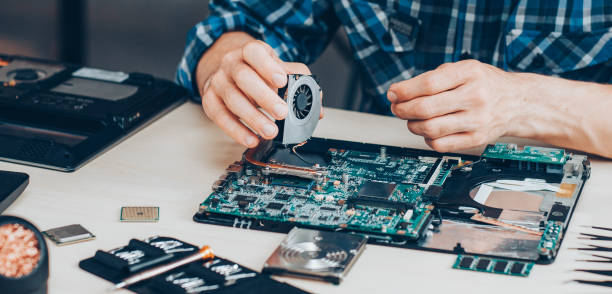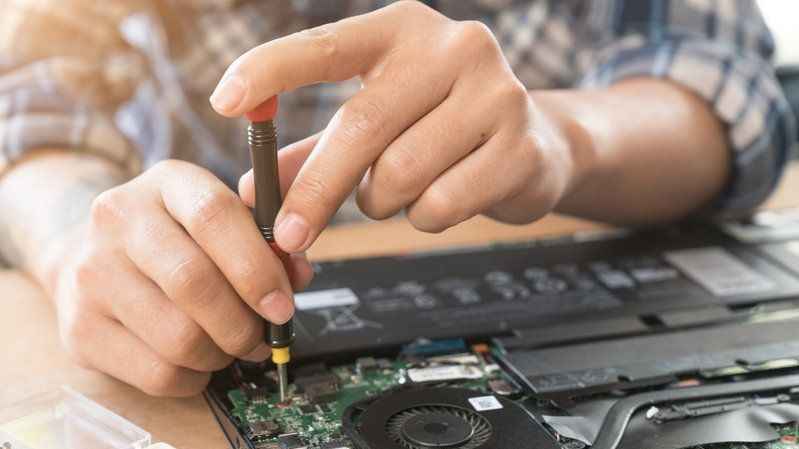Laptop and Computer Repairing Tips – Laptops and computers have become indispensable tools in our daily lives, from professional work to entertainment and communication. However, like any electronic device, they are prone to issues and malfunctions. Knowing some basic repairing tips can save you time and money by avoiding unnecessary trips to a service center. In this blog, we Laptop and Desktop Repair Company Chennai will explore a comprehensive guide to laptop and computer repairing tips that can help you troubleshoot common problems and potentially fix them on your own. Remember, while these tips can be helpful for minor issues, it’s crucial to seek professional help for complex or hardware-related problems.

Identify Common Software Issues
- ManyLaptop and Computer Repairing Tips – problems can be attributed to software-related issues. Here are some tips to troubleshoot and resolve common software problems:
A. Restart the Device: A simple restart can often resolve minor software glitches and restore normal functionality.
B. Update Operating System and Drivers: Keeping your operating system and drivers up to date can help address compatibility issues and improve system performance.
C. Run Antivirus and Malware Scans: Regularly scanning your device for viruses and malware can help identify and eliminate potential threats that may be causing system slowdowns or other issues. Additionally, if you’re experiencing connectivity problems, troubleshooting network issues can be an effective way to identify and resolve problems related to Wi-Fi, routers, or network settings, improving your overall device performance.
D. Utilize System Restore Points: Laptop and Computer Repairing Tips – If you’re encountering persistent issues, using a previously created system restore point can help roll back your system settings to a stable state. For convenience, you can also consider laptop repair at home, where a technician can guide you through troubleshooting steps or fix minor issues without the need to visit a service center. However, for more complex problems, seeking professional assistance may still be necessary.

Diagnose and Solve Hardware Issues (Important Laptop and Computer Repairing Tips)
- While software issues are common, hardware problems may require more expertise. However, here are some tips to diagnose and potentially resolve certain hardware-related issues:
A. Check Power Supply and Connections: Ensure that your laptop or computer is properly connected to a power source. Sometimes, loose power connections can cause issues.
B. Examine and Clean the Cooling System: Overheating is a common cause of laptop and computer malfunctions. Clean the cooling system regularly and ensure proper ventilation to prevent overheating.
C. Test and Replace Faulty RAM Modules: Random Access Memory (RAM) issues can cause system crashes and slow performance. Running a memory diagnostic test and replacing faulty RAM modules can help resolve these issues. Similarly, if you’re facing other hardware problems, like a laptop keyboard not working fix, addressing these issues promptly can improve your device’s overall performance and usability.
D. Clean Dust and Debris: Accumulated dust and debris can hamper the performance of components such as the keyboard, fan, and vents. Regularly cleaning these areas to maintain optimal functioning is essential. Additionally, incorporating basic networking troubleshooting can help resolve issues with connectivity, ensuring your laptop or computer works efficiently both in terms of hardware and network performance.
Resolve Connectivity Problems
- Connectivity issues can be frustrating, but there are several steps you can take to troubleshoot and resolve them:
A. Check Network Connections: Ensure that your laptop or computer is properly connected to the network. Verify cables, Wi-Fi settings, and router connections.
B. Reset Network Settings: If you’re experiencing persistent connectivity issues, resetting your network settings or reinstalling network drivers may help.
C. Update Network Drivers: Outdated or incompatible network drivers can cause connectivity problems. Updating them from the manufacturer’s website can resolve such issues.
D. Troubleshoot Peripheral Connectivity: If you’re encountering issues with peripherals like printers or external storage devices, ensure proper connections and update drivers as needed.
While not all Laptop and Computer Repairing Tips (Problems) can be fixed without professional assistance, having a basic understanding of common issues and some troubleshooting tips can be immensely helpful. By following these laptop and computer repairing tips, you can potentially resolve minor issues and improve the overall performance of your devices. However, it’s essential to exercise caution and seek professional help for complex or hardware-related problems to avoid causing further damage. With a little knowledge and the right approach, you can become more self-reliant in dealing with common laptop and computer issues, saving both time and money in the process.

